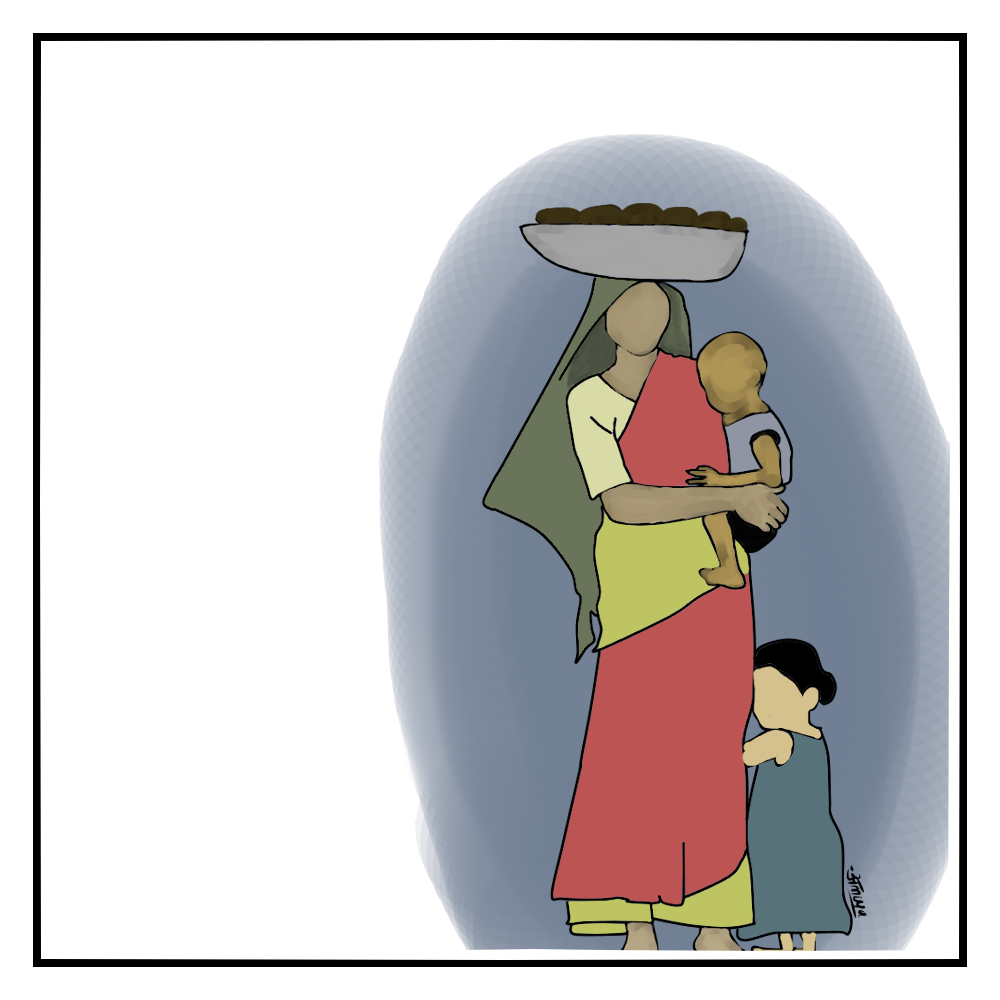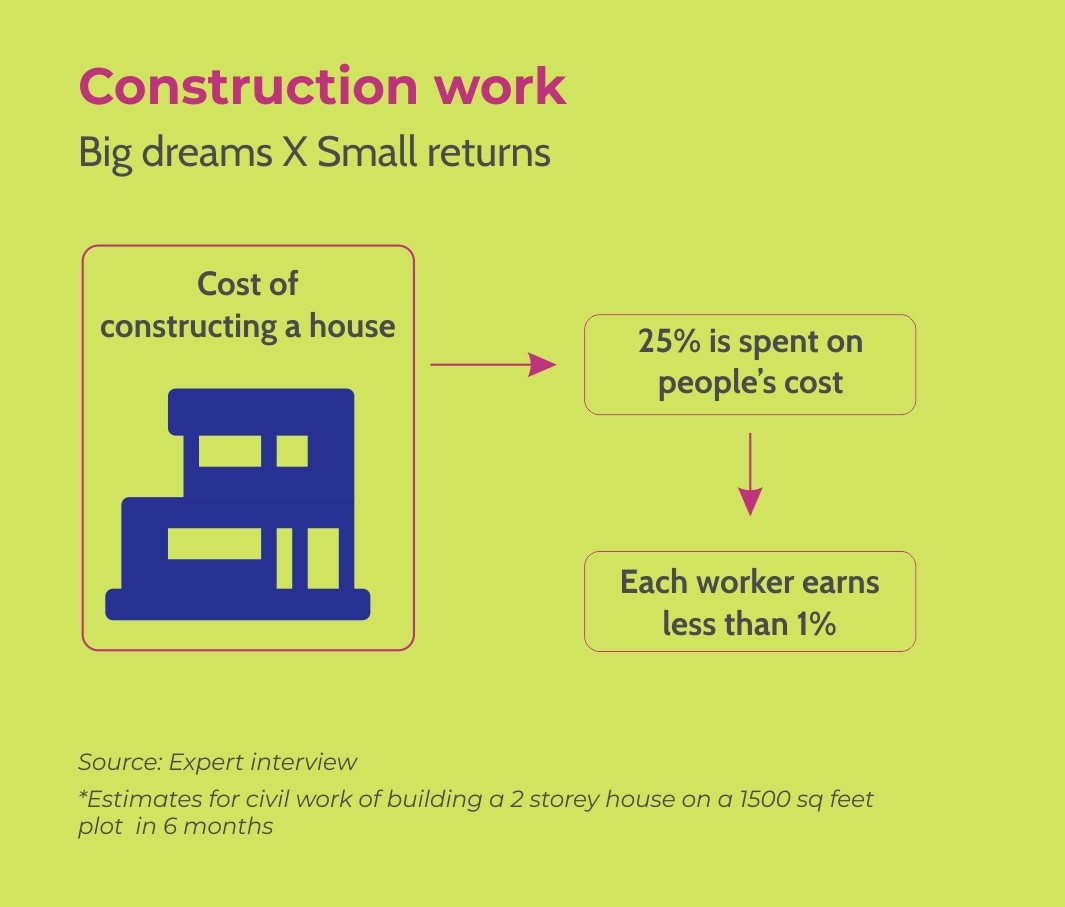July, 2020
A glimpse of a day in the life of a female construction worker, through her own eyes
4 minutes read
The throbbing ache in her limbs is what hits her first as she wakes up. Shilpa, a young mother with two kids, is still new to the construction sector. Everyone told her that you slowly get used to the pain and she hopes it is true. She used to work in the fields which were not an easy task either but this is much more taxing.
She rolls over to see her kids sleeping peacefully, albeit on a half-empty stomach. She still remembers how reluctant they were to move to the city. But, when her husband passed away in a road accident, Shilpa did not have any other alternative. Her father’s measly income hardly covered her mother’s medical expenses, so asking her parents for support was not an option. It was when she was at her lowest point that her cousin who worked in the city had talked her into working in construction. He was on good terms with the contractor which helped her get the job and she thanked her lucky stars for that. The thought of construction work felt both alien and difficult to her initially and to be honest, it still felt more or less the same.
She jolts herself out of her memories and gets up to get her day started. Soon, the home is filled with the noisy energy typical of mornings. As she packs lunch, the elder one, Lekshmi (7), helps her younger brother, Rahul (3), get ready. The only thing that helps Shilpa get through the day is the fact that her kids are well taken care of. There was an NGO that ran a free creche service for the children of the construction labourers. The kids were very excited to go there and Shilpa was glad that they were getting something in the way of education. They lived in a chawl close to the site and the morning commute was a 5-minute walk.

Getting to the site early is crucial. The people needed are decided on a day to day basis and 10 minutes can make the difference between wages and no wages. She manages to reach work on time and finds out that she is needed. So far, so good.
She manages to grab one of the safety helmets too for the first time (the safety equipment and harnesses available are far lesser than the number of people who need them), it must be her lucky day!
As she carried yet another load of bricks, she heard the contractor discussing how the site work was likely to be wrapped up in a month. Shilpa’s heart lurched, she had expected the work to go on for at least two more months. Once this was done, she knew that she would have to join hundreds of labourers at the nakas (labour markets) and fight for a job every day. That meant getting up at the crack of dawn, haggling with the contractors and going without work and wages for days. “Hey, keep it moving”, the voice of the foreman pulled her out of her thoughts and she kept going.
At the end of the day, Shilpa collected the wage and saw as she did every day, the men who worked shoulder to shoulder with her getting an extra 150 rupees for reasons unknown to her. Speaking out against this was never on the cards because once you got yourself a reputation as a troublemaker, the news spread fast and contractors became very reluctant to hire you.

She walks home with the kids, listening to them talk excitedly about what Neeta ma’am taught them, and the prank Seema had tried to pull and failed. Shilpa listens to them with a faint smile on her lips. Usually, this is the best part of her day when she can forget her worries of day to day survival and just enjoy some time alone with her children. But today she is not able to enjoy it. She is thinking about who will take care of the kids when this project is over. Will the next site have a similar facility? Will she be able to afford government school for the older one at least? The thought of taking her 3-year-old to the site and leaving him unsupervised fills her with terror.
The aloo parantha she had made for lunch and never got the time to eat doubles as her supper. The kids were fed at the creche. As she turns in for the night completing the household chores, sleep eludes her. The words of the contractor echo in her mind. Will she be able to find work every day? What will the wages be like? Will she able to manage with lower wages? Her last thought before she falls asleep is that all the hard work and pain would be endurable only if it held the promise of something resembling job security. If only she had that, she would even be okay with earning 100 rupees less, if only!
References
- Remote interviews conducted by the team at Women’s Identity and Progress

Deep
Expressive.. very well portrayed the life of women construction workers
[…] went about her morning chores (click here to know HER story), humming softly to herself. Her life had finally fallen into a somewhat […]
[…] Meet Shilpa.. […]
Beautiful penned. Highlights the various dimensions which plague these women who wander in the search for forgotten promise
Beautifully penned. Highlights the various dimensions which plague these women who wander in the search of a forgotten promise